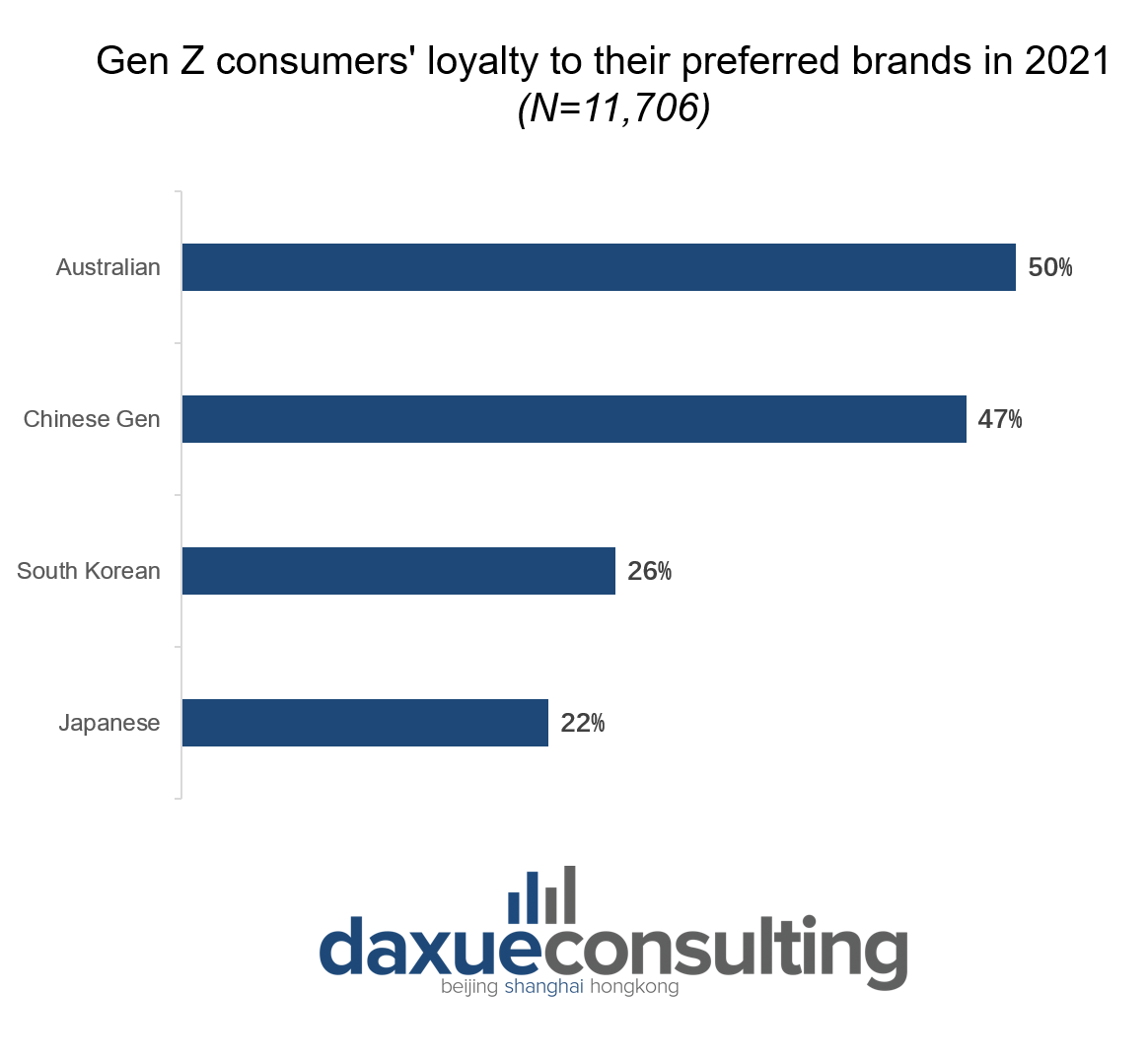Customer loyalty, the emotional connection and dedication towards a company’s products or services, plays a crucial role in business success. Loyal customers not only contribute to the primary profit stream of an enterprise but also actively engage in brand marketing by voluntarily promoting the brand through word-of-mouth recommendations and positive online reviews. However, the approach to building and maintaining customer loyalty in China may be somehow different from that in Western countries.
What makes Chinese consumers special regarding brand loyalty?
Generation Z in China is quickly becoming one of the most influential consumer segments. However, marketers face a dilemma in engaging with this group: despite their considerable purchasing power, these young customers exhibit limited brand loyalty and often switch to rival brands with each new purchase. This poses a challenge for client retention strategies. and necessitates increased marketing efforts to maintain their loyalty. Consequently, achieving success in brand marketing becomes even more critical, given the need to counteract these tendencies and optimize marketing expenditures.
However, Chinese Gen Z consumers are more loyal to brands than their counterparts in other countries, especially in South Korea and Japan. According to a 2020 survey conducted by McKinsey, 47% of respondents claimed they are loyal to their favorite brands, while 43% expressed a consistent preference for familiar brands over new ones.

The way people shop, especially online, has changed. The focus has shifted from brands to products, influenced by factors like live delivery and having reliable sources of information during the shopping process. This includes customer service representatives, influencers, or recommendations from friends and family. As a result, consumers now spend more time researching and trying out products before making a purchase. These changes highlight the growing importance of product quality and suitability, surpassing brand loyalty in the shopping experience.
The key to build customer loyalty in China: quality, marketing, personalization and loyalty programs
1. Good product quality is the basis for customer loyalty
The core of customer loyalty is good product quality, which ensures that customers receive value and satisfaction from their purchase. According to Merkle, 60% respondents declare that a good product is the top reason they feel loyal to a brand. Customers who are pleased with the quality of a product are more inclined to return, suggest it to others, and stick with the brand. High-quality items can help build a strong brand image by demonstrating a company’s dedication to excellence and client pleasure. Furthermore, high product quality improves the whole client experience. It reduces the possibility of product failures, malfunctions, or disappointments, resulting in improved customer trust and confidence in the brand. Therefore, brands can differentiate themselves from competition, acquire more clients, and cultivate a loyal customer base by focusing on maintaining excellent product quality.
2. Resonating with consumers’ values can improve consumer loyalty
An effective marketing strategy also plays a crucial role in fostering customer loyalty. Marketing allows brands to effectively communicate with their customers, informing them about new products, promotions, and updates. Regular communication helps keep customers engaged and connected with the brand, enhancing their loyalty. Also, a well-crafted marketing strategy helps building brand recognition and awareness among customers. When customers can easily identify and recall a brand, they are more likely to choose it over competitors, resulting in increased loyalty.
Effective marketing campaigns have the power to create emotional connections with customers. Brands can build a stronger link with customers by appealing to their beliefs, goals, or emotions, resulting in long-term loyalty. For example, Neiwai, a lingerie brand in China, incorporated feminism as one of its marketing strategies and successfully launched an annual campaign “NO BODY IS NOBODY,” aimed to promote body diversity. Through this campaign, the brand sought to combat appearance anxiety and body shaming by encouraging Chinese women to embrace their bodies and feel comfortable with themselves. As a result, the brand’s consumer loyalty and reputation have significantly improved.

3. Personalization is the key to stand out in the market
In today’s competitive marketplace, personalization helps brands stand out from their competitors. Customers are more likely to choose and stick with a brand that understands and caters to their individual needs. By offering personalized experiences, brands can gain a competitive edge and differentiate themselves in the market. To provide personalized experiences for their customers, brands can customize communications and offer to specific client categories, making customers feel understood and valued, thereby increasing their loyalty towards the brand.
4. Loyalty programs make significant contributions
Loyalty programs have become a ubiquitous marketing strategy in China for businesses to build long-term relationships with customers and encourage ongoing engagement. These programs, available in various forms like membership cards or points systems, offer benefits such as discount coupons and vouchers to foster customer loyalty and increase lifetime value. Chinese consumers highly value these programs, as they provide a sense of belonging and special treatment.
For instance, Starbucks in China has a popular loyalty program that includes a stylish gift card. Cardholders enjoy exclusive benefits like free refills, free syrup, and regular gifts. Despite the availability of online payments, physical membership cards remain popular due to their appealing artwork.

Chinese brands have excelled in leveraging the Guochao trend to enhance customer loyalty
Guochao (国潮) refers to the increase in consumer favoritism towards Chinese brands, designs, and culture. In recent years, the pursuit of Guochao aesthetic is influencing the Chinese market, making consumers more concerned about the cultural value of products. However, Chinese brands have outperformed Western brands in leveraging the Guochao trend to enhance customer loyalty. That’s because Chinese brands can better tap into the deep cultural roots of the country and incorporate them into their products and marketing strategies. By showcasing elements like traditional designs, symbols, or folklore, they strike a chord with Chinese consumers who value their heritage. This cultural relevance creates a sense of pride and connection, leading to increased loyalty.

KFC succeeded in building customer loyalty by localizing its offer
KFC has successfully implemented a localization strategy in China, positioning itself as a Western fast-food brand with Chinese characteristics. To cater to Chinese consumers, KFC introduced unique menu items such as egg tarts, Beijing chicken rolls, and youtiao (deep-fried dough sticks), which resonated well with Chinese tastes and contributed to customer loyalty.
Moreover, KFC’s “Good Morning · Taste of the City” program offers regionally tailored breakfast options, further strengthening its position and capturing a significant market share in China’s Quick Service Restaurant (QSR) market.

How to build and maintain customer loyalty in China
- In China, the Generation Z is gradually becoming an important driver of consumption, but these young customers exhibit limited brand loyalty and often switch to rival brands with each new purchase. As a result, developing and maintaining customer loyalty in China is quite critical.
- Product quality, brand values, personalization, and loyalty programs are the keys to building consumer loyalty in China.
- The core of customer loyalty is good product quality, which ensures that customers receive value and satisfaction from their purchase.
- An effective marketing strategy is vital in fostering customer loyalty by informing them about new products, promotions, and updates, and building a stronger emotional connection based on shared beliefs and goals.
- Personalization sets brands apart by catering to customers’ individual needs, creating a competitive edge and fostering loyalty.
- Loyalty programs in China build lasting customer relationships, offering benefits and rewards like Starbucks’ popular gift card program.
Author: Lyu Ai
Read our report on the future of sustainable fashion






